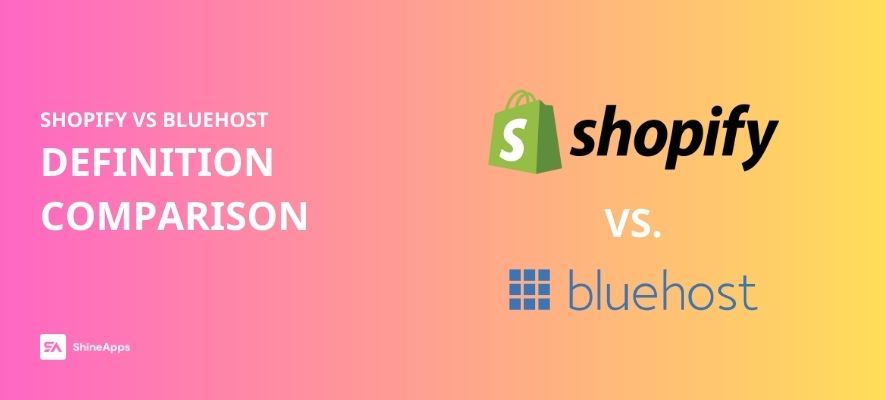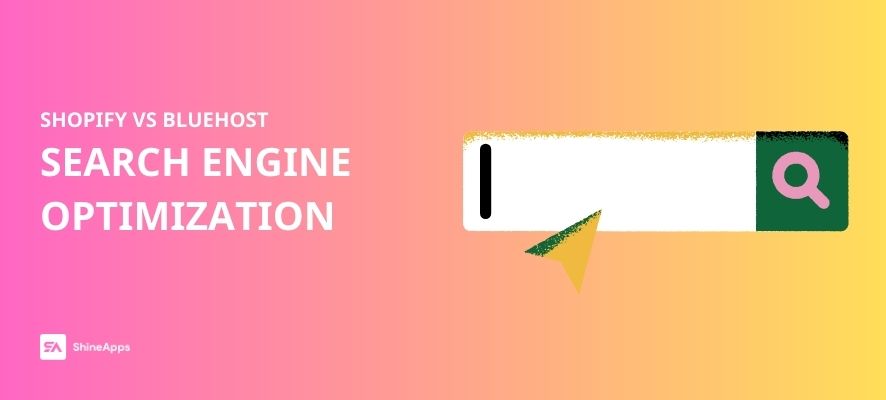It’s ecommerce comparison column time! Looking for a method to create an online ecommerce store? We’ll look at both solutions and compare how well they support online stores between Shopify and Bluehost.
Definition Comparison

Bluehost is a web hosting platform with many features, including low-cost plans that attract prospects and webmasters. On the other hand, Shopify is an ecommerce platform where you can create an online store without any coding skills.
If you need to improve your technical skills, Shopify is a good ecommerce platform for you to use when setting up your online dropshipping business. However, if you prefer to build an online store on WordPress, then Bluehost is a good choice for you.
Shopify vs. Bluehost - Pricing & Value

Shopify Basic & Bluehost Starter
A single online store is available with both the Bluehost Starter and Shopify Basic plans, but Shopify additionally comes with a blog. With Bluehost, you can also set one up, but it will require some additional work on your part.
Things are a little bit clearer with Bluehost. The Starter package comes with unmetered bandwidth and 100GB of SSD storage. There are some limitations in place to avoid errors, but you won’t ever experience limitations on bandwidth if you don’t launch a file-hosting website on your account.
In terms of eCommerce features, WooCommerce and the Storefront theme are already installed with Bluehost Starter. If using WordPress is okay with you, you may begin working on your website as soon as you log in. With just a few extra steps, you may install a different CMS using Bluehost’s one-click installation if you choose to do so.
With Shopify, creating an online store is just as simple because you have direct access to the provider’s own CMS. You might not have access to all the features you desire for your website, and you won’t be able to use a different CMS.
Free email, an SSL certificate, and a free domain are available on all plans from Bluehost and Shopify.
Having said that, the pricing for the two plans couldn’t be more different. With this exclusive offer, the Bluehost WooCommerce Starter plan costs less than $7 per month, while Shopify’s Basic plan costs four times as much.
Shopify Standard vs. Bluehost Plus
You can host an unlimited number of websites with Bluehost Plus by paying an additional $2. Additionally, you receive unlimited bandwidth and storage space, allowing you to quickly upload as many images and videos of various products as you require. Just keep in mind that you need them to maintain quick page loads.
With a monthly cost of $79, Shopify’s Standard plan quickly becomes quite expensive. What extras do you receive? You can add more physical locations for your stores and goods, add more user accounts for your workers to log into your dashboard, and work with Shopify’s partners to receive better shipping discounts. It’s not a terrible update, but once again, the price is pretty costly compared to the value received.
Shopify Advanced vs. Bluehost Pro
The Shopify Advanced package offers more computing power, more staff accounts, more physical locations, and a few other services, including calculated shipping costs from third parties. But you’ll pay a price for it all.
Since Shopify Advanced costs $299 per month, which is nearly 20 times more than Bluehost Pro, Bluehost is your only real choice if you’re just starting out in business. Bluehost Pro costs only $12.95 per month if you choose a long-term plan. You receive precisely everything you require to operate a profitable online store for this price.
A one-click installer for WooCommerce + Storefront and any other well-known eCommerce CMS is included in the package, along with unlimited websites, storage, and bandwidth, domain privacy, a free SSL certificate, daily automatic backups, free email, and Bluehost’s SEO suite.
You have plenty of time to start your business before making a big financial commitment with Bluehost Pro’s inexpensive but full eCommerce service. Although it’s not quite as powerful as Shopify’s Advanced plan, it’s still more than needed for a new online store. You may always move your website to one of Bluehost’s dedicated or virtual private servers when you’re ready for an upgrade.
You don’t need an advanced website hosting plan to get started with an online store. You have the choice to start with a low-cost shared hosting package from Bluehost and upgrade as necessary. By doing this, you avoid having to pay in advance for services you might not use in the future.
Which Is Better?
Bluehost is less expensive than Shopify, especially if you choose a long-term subscription. However, there is a small catch. Only your first payment period is accepted at Bluehost’s headline prices. You must pay Bluehost’s high renewal fees once your initial term expires, which can nearly triple the price.
Nevertheless, your cost is still lower than it would be if you used Shopify. Bluehost is by far the superior choice between the two if budgeting is important to you. In cases, you need all-in-one platform support for an eCommerce online store and budget is not the most important factor, Shopify’s services and tools are created specifically for creating and managing online stores.
Refer to Which Shopify Plans Should I Choose Best for more details.
Page Load Time Comparison

Bluehost, an innovator in web hosting, has been known for regularly delivering websites of all sizes at fast loading times. You should not worry about a slow site as long as you select a package that is appropriate for the number of daily visits you receive.
Shopify’s loading times are very fast. Despite not being quite as old as Bluehost, Google Cloud Platform has a network that is quite fast. The platform makes effective use of GCP and employs several independently optimized methods to improve performance further.
You have more ability to customize your stack while using Bluehost. On the other hand, beginners can easily and quickly boost site performance with Shopify.
Features Comparison
Bluehost | Shopify |
|
|
Customer Support Ecommerce Comparison

Both Bluehost and Shopify provide careful, 24/7 customer service via live chat, email, and phone. It was fantastic because you never had to wait long for someone to answer your question. There were a few disadvantages, though. While the customer support staff at Shopify and Bluehost were polite and ready to assist, you might have to wait a while if you had a more technical issue.
Search Engine Optimization Comparison

You won’t need to worry much about SEO if you use Bluehost or Shopify. You won’t have to put in a lot of extra effort because both providers make it a point to assist you with website optimization as you develop it.
Shopify provides you with a website structure that is suitable for SEO, meaning that most of the SEO tasks are automated. For instance, canonical tags that help with avoiding duplicate material from appearing in search results and title tags containing your store’s name are automatically generated. Additionally, Shopify creates a sitemap for your website and provides a simple editing tool for title tags, URLs, and meta descriptions.
On the other side, WooCommerce, a WordPress plugin for online stores, is supported by Bluehost. WooCommerce doesn’t have many SEO tools by itself. It uses SEO-friendly code to design your website, but if you want more, you must install another plugin.
The Bluehost package comes with free access to the company’s in-house SEO tools as well. They include many of the features you get with Shopify as well as helpful site statistics.
In Conclusion
Although Shopify is a strong eCommerce platform with numerous benefits over web hosting, its cost makes it largely out of reach for small and medium-sized businesses. In this ecommerce comparison between Bluehost and Shopify, based on your budget and technical skills, you can choose the best for your business!



